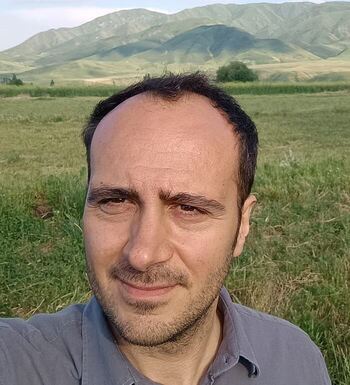Studying at the University of Verona
Here you can find information on the organisational aspects of the Programme, lecture timetables, learning activities and useful contact details for your time at the University, from enrolment to graduation.
Academic calendar
The academic calendar shows the deadlines and scheduled events that are relevant to students, teaching and technical-administrative staff of the University. Public holidays and University closures are also indicated. The academic year normally begins on 1 October each year and ends on 30 September of the following year.
Course calendar
The Academic Calendar sets out the degree programme lecture and exam timetables, as well as the relevant university closure dates..
| Period | From | To |
|---|---|---|
| Sem. 1A | Sep 24, 2018 | Nov 10, 2018 |
| Sem. 1B | Nov 19, 2018 | Jan 12, 2019 |
| Sem. 2A | Feb 18, 2019 | Mar 30, 2019 |
| Sem. 2B | Apr 8, 2019 | Jun 1, 2019 |
| Session | From | To |
|---|---|---|
| Sessione Invernale | Jan 14, 2019 | Feb 16, 2019 |
| Sessione Estiva (Gli esami sono sospesi durante la Sessione di laurea) | Jun 3, 2019 | Jul 27, 2019 |
| Sessione Autunnale | Aug 26, 2019 | Sep 21, 2019 |
| Session | From | To |
|---|---|---|
| Sessione Estiva | Jul 8, 2019 | Jul 13, 2019 |
| Sessione Autunnale | Nov 4, 2019 | Nov 9, 2019 |
| Sessione Invernale | Mar 30, 2020 | Apr 4, 2020 |
| Period | From | To |
|---|---|---|
| Festa di Ognissanti | Nov 1, 2018 | Nov 1, 2018 |
| Festa dell’Immacolata | Dec 8, 2018 | Dec 8, 2018 |
| Vacanze di Natale | Dec 22, 2018 | Jan 6, 2019 |
| Vacanze di Pasqua | Apr 19, 2019 | Apr 23, 2019 |
| Festa della liberazione | Apr 25, 2019 | Apr 25, 2019 |
| Festa del lavoro | May 1, 2019 | May 1, 2019 |
| Festa del Santo Patrono - S. Zeno | May 21, 2019 | May 21, 2019 |
| Festa della Repubblica | Jun 2, 2019 | Jun 2, 2019 |
| Vacanze Estive | Aug 12, 2019 | Aug 17, 2019 |
Exam calendar
Exam dates and rounds are managed by the relevant Humanistic Studies Teaching and Student Services Unit.
To view all the exam sessions available, please use the Exam dashboard on ESSE3.
If you forgot your login details or have problems logging in, please contact the relevant IT HelpDesk, or check the login details recovery web page.
Should you have any doubts or questions, please check the Enrollment FAQs
Academic staff
 francesco.bianchi@univr.it
francesco.bianchi@univr.it
 bonifacio@teologiaverona.it
bonifacio@teologiaverona.it
 evita.calabrese@univr.it
evita.calabrese@univr.it
 andrea.cavalletti@univr.it
andrea.cavalletti@univr.it
 francesco.lupi@univr.it
francesco.lupi@univr.it

Mastrocinque Attilio
 attilio.mastrocinque@univr.it
attilio.mastrocinque@univr.it
 +39 045802 8386
+39 045802 8386
 linda.napolitano@univr.it
linda.napolitano@univr.it
 pieralberto.porcedducilione@univr.it; pierre_pordd@yahoo.it
pieralberto.porcedducilione@univr.it; pierre_pordd@yahoo.it
 045 8028732
045 8028732
 nicola.turrini@univr.it
nicola.turrini@univr.it
 lucia.vantini@univr.it
lucia.vantini@univr.it
 mariarenata.zanchin@univr.it
mariarenata.zanchin@univr.it
Study Plan
The Study Plan includes all modules, teaching and learning activities that each student will need to undertake during their time at the University.
Please select your Study Plan based on your enrollment year.
1° Year
| Modules | Credits | TAF | SSD |
|---|
Other activities2° Year activated in the A.Y. 2019/2020
| Modules | Credits | TAF | SSD |
|---|
1 module to be chosen among the following1 module to be chosen among the following3 modules to be chosen among the following3° Year activated in the A.Y. 2020/2021
| Modules | Credits | TAF | SSD |
|---|
3 modules to be chosen among the following1 module to be chosen among the following| Modules | Credits | TAF | SSD |
|---|
Other activities| Modules | Credits | TAF | SSD |
|---|
1 module to be chosen among the following1 module to be chosen among the following3 modules to be chosen among the following| Modules | Credits | TAF | SSD |
|---|
3 modules to be chosen among the following1 module to be chosen among the following| Modules | Credits | TAF | SSD |
|---|
2 modules to be chosen among the following3 modules to be chosen among the followingLegend | Type of training activity (TTA)
TAF (Type of Educational Activity) All courses and activities are classified into different types of educational activities, indicated by a letter.
Moral Philosophy (2020/2021)
Teaching code
4S00765
Teacher
Coordinator
Credits
12
Language
Italian
Scientific Disciplinary Sector (SSD)
M-FIL/03 - MORAL PHILOSOPHY
Period
Sem. 1A, Sem. 1B
Learning outcomes
The course aims to provide students with the knowledge of the great classics of moral philosophy and the main themes of the Western philosophical tradition emerging from them. It also aims to promote the development of the skills: to understand philosophical moral texts within their historical-critical framework and through a correct hermeneutic approach; to appropriately use a thoroughly philosophical terminology; and to produce individual reflection in order to formulate independent judgements on the genesis, nature and meaning of the addressed issues. Finally, these objectives are also understood in order to develop the ability to continue studies in a Master’s degree, and the ability to communicate philosophical contents to specialists and non-specialists alike.
Program
Moral philosophy and dialectics: for a comparison between the thoughts of Kant and Hegel.
An interpretation and discussion will be proposed on the different meanings of dialectics in Kant’s and Hegel’s thoughts with reference to the field of moral philosophy, taking as a reference for the former the “Critique of Practical Reason” and for the latter the “Encyclopedia of the Philosophical Sciences in outline” (1830).
For this purpose, the following points will be developed inter alia:
- Dialectical aspects in the search for the highest Good according to Kant in the “Critique of Practical Reason”;
- The dialectic between virtuousness and happiness and the antinomy of practical Reason;
- Moral destination of the human being and postulates of Practical Reason according to Kant;
- The relationship between Speculative and Practical Reason: the proportion between the faculties in the light of the “Dialectic of Pure Practical Reason”;
- “Doctrine of method of pure practical Reason” and the issue of moral testimony according to Kant;
- Infinity and wisdom in the “Conclusion” of the “Critique of Practical Reason”;
- Subjective Spirit and objective Spirit within the Philosophy of the Spirit and its dialectical and systematic meaning according to Hegel: the relationship between dialectics and freedom;
- Soul, consciousness and Spirit in Hegel’s understanding of the subjective Spirit;
- Law, morality and ethical life within the objective Spirit according to Hegel.
Mandatory Reference Texts
1) Immanuel Kant, Critica della Ragion Pratica, traduzione di F. Capra riveduta da E. Garin, con Glossario e Indice dei nomi a cura di V. Mathieu, introduzione di S. Landucci, Laterza [Classici della Filosofia con testo a fronte], Roma-Bari 2001, pages 235-385 (it is needed to take into account even the “Glossario” and the “Indici” also to be found in the just indicated page range);
2) S. Landucci, Genesi e struttura dell’opera, in Kant, Critica della Ragion Pratica, cit., pp. V-XXVII (this is the Introduction to the above mentioned edition of “Critica della Ragion Pratica”);
3) G.W.F. Hegel, Enciclopedia delle scienze filosofiche in compendio (1830), testo tedesco a fronte, introduzione, traduzione, note e apparati di Vincenzo Cicero, Giunti, Firenze-Milano 2017, Parte Terza “La Filosofia dello Spirito”, “Introduzione” and “Lo spirito soggettivo” and “Lo spirito oggettivo”, pages 635-895 and also the related notes to the text, numbers 275-345, pages 977-980.
4) L. Illetterati-P. Giuspoli-G. Mendola, Hegel, Carocci, Roma 2010, only Chapters 6 and 7, pages 233-296.
5) Conceptual schemes of lessons by e-learning: after each lesson a short written conceptual summary of that lesson will be loaded on the e-learning platform of the University.
The reference texts here above are mandatory for both attending and non-attending students.
The teaching methods consist of lectures during which analysis, comment and discussion of the reference texts will take place, thus addressing the program contents from the perspective of the learning outcomes.
These lectures will be provided remotely: unless otherwise indicated, they will be held in live streaming via the “Zoom” application, according to the dates and times indicated in the lesson timetable. These lectures will be accessed by the e-learning of the course on the platform “Moodle”: interested people are therefore invited, if they have not already done so, to enrol in the e-learning of the course. These lessons will also be recorded and subsequently made available for later viewing in the e-learning of the course. In the same e-learning will also be loaded short written conceptual schemes of each lesson, after its conclusion.
| Author | Title | Publishing house | Year | ISBN | Notes |
|---|---|---|---|---|---|
| Immanuel Kant | Critica della ragion pratica | Laterza | 2001 | 88-420-5115-2 | Traduzione di F. Capra riveduta da E. Garin, con Glossario e Indice dei nomi a cura di V. Mathieu, introduzione di S. Landucci [Classici della Filosofia con testo a fronte], pagine V-XXVII e 235-385. |
| Georg Wilhelm Friedrich Hegel | Enciclopedia delle scienze filosofiche in compendio (1830) | Giunti | 2017 | 978-88-452-9083-1 | Testo tedesco a fronte, Introduzione, traduzione, note e apparati di Vincenzo Cicero, pagine 635-895 e 977-980. |
| Luca Illetterati-Paolo Giuspoli-Gianluca Mendola | Hegel | Carocci | 2010 | 978-88-430-5271-4 | Pagine 233-296. |
Examination Methods
For both attending and non-attending students the exam consists of an oral test (in person or online, if this latter will be indicated by University provisions) concerning the program and the reading list above indicated as “mandatory reference texts”.
To pass the exam, students will have to demonstrate that they have achieved the learning outcomes; therefore the following will be verified:
1) Acquired knowledge and interpretation skills concerning mandatory reference texts and course program, in the light of a valid critical and hermeneutical approach to those same texts and to addressed issues;
2) Skill to use a thoroughly philosophical terminology;
3) Skill to develop a reflection in the perspective of moral philosophy on the addressed issues.
The grades are expressed in thirtieths.
Update: considering the continuing COVID-19 emergency, during the winter session 2020/2021 the above mentioned oral exam will be carried out remotely.
Update 2: also during the summer session 2020/2021 the above mentioned oral exam will be carried out remotely.
Type D and Type F activities
Modules not yet included
Career prospects
Module/Programme news
News for students
There you will find information, resources and services useful during your time at the University (Student’s exam record, your study plan on ESSE3, Distance Learning courses, university email account, office forms, administrative procedures, etc.). You can log into MyUnivr with your GIA login details: only in this way will you be able to receive notification of all the notices from your teachers and your secretariat via email and also via the Univr app.
Student mentoring
Linguistic training CLA
Gestione carriere
Practical information for students
Documents
| Title | Info File |
|---|---|
|
|
pdf, it, 325 KB, 16/07/24 |
|
|
pdf, it, 212 KB, 02/05/23 |
|
|
pdf, it, 131 KB, 02/05/23 |
Graduation
Documents
| Title | Info File |
|---|---|
|
|
pdf, it, 109 KB, 12/07/24 |
|
|
pdf, it, 112 KB, 14/05/24 |







































